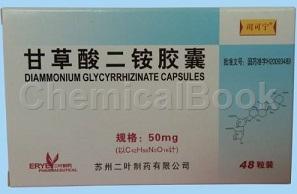Hepatitis B is a highly contagious disease, and patients suffer a lot from their mental and physical health. At present, the treatment of hepatitis B is still a bottleneck in medicine. There is no definite method that can completely cure hepatitis B. The commonly used method to treat hepatitis B is drug treatment. Diammonium glycyrrhizinate enteric-coated capsules are currently relatively widely used in clinical practice. Drugs used to treat hepatitis B.
Diammonium glycyrrhizinate capsules are used for the treatment of acute and chronic viral hepatitis associated with elevated alanine aminotransferase. Glycyrrhizic acid Er’an capsule is the third generation extract of the active ingredient of traditional Chinese medicine licorice. It has strong anti-inflammatory effects, protects liver cell membranes and improves liver function. Glycyrrhizic acid diamine capsules are similar in chemical structure to the steroid ring of aldosterone, which can hinder the inactivation of cortisone and aldosterone, thus exerting steroid-like effects without the adverse reactions of corticosteroids.

Adverse reactions
Side effects and adverse reactions are more or less involved in every drug. When taking glycyrrhizic acid diamine capsules normally, the following adverse reactions may still occur: such as anorexia, nausea, vomiting, abdominal distension, skin itching, hives, dry mouth and edema, and cardiovascular and cerebrovascular system symptoms such as headache, dizziness, Chest tightness, palpitations and increased blood pressure. However, since the above symptoms are generally mild, there is no need to stop taking the medication. However, patients need to be reminded that blood pressure, serum potassium, and sodium concentrations should be measured regularly during treatment with diammonium glycyrrhizinate capsules. If hypertension, sodium retention, hypokalemia, etc. occur, the medication should be discontinued or the dosage should be appropriately reduced.
Precautions for use
In the treatment of patients with hepatitis B and other hepatitis, rest is as important as medication. Hepatitis patients should go to bed early and get up late, get adequate rest, and actively increase the time in bed during the day. Depending on the condition, 2 to 4 hours is appropriate. When lying in bed, the blood returning to the liver increases, which is beneficial to improving liver microcirculation and promoting the recovery of inflammation. When liver inflammation is active (ALT elevation, >80u/L), physical exercise is not appropriate, and heavy physical labor or long-distance travel should also be avoided.
Patients with chronic hepatitis B or hepatitis C must pay attention to a reasonable diet during liver inflammation activity (when ALT and/or AST are elevated), such as three regular and quantitative meals a day, avoid eating spicy, exciting, cold, and greasy foods, and advocate a light diet. , mainly based on grains and fresh vegetables, does not have to be completely vegetarian, but foods with high sugar, high protein, high fat, and high cholesterol should be limited, such as seafood, meat (especially mutton, dog meat or animal offal, etc.), eggs, Fried food etc.

 微信扫一扫打赏
微信扫一扫打赏

